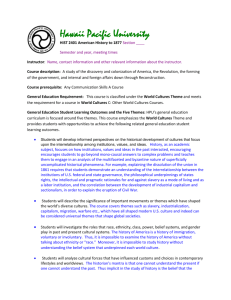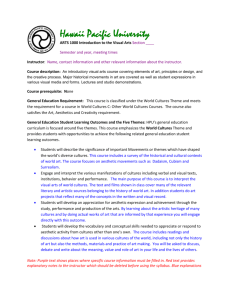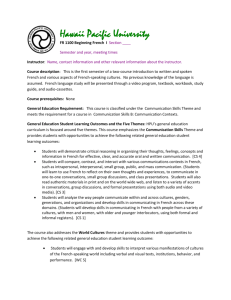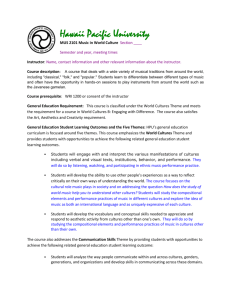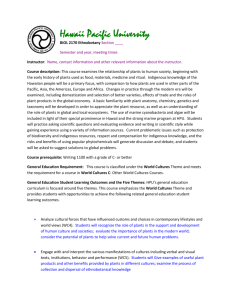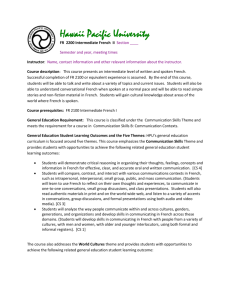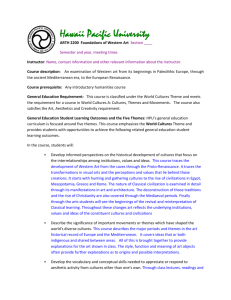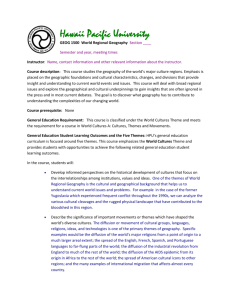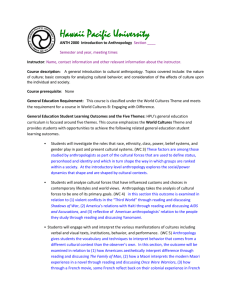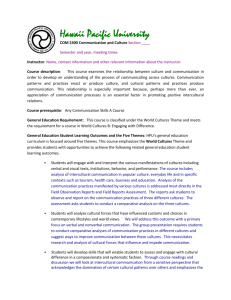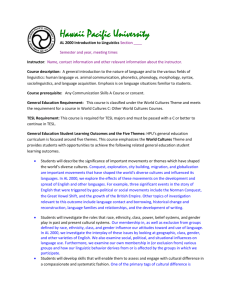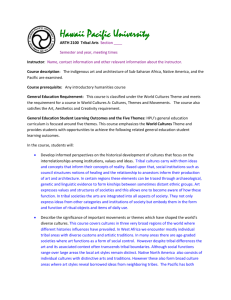Hawaii Pacific University
advertisement
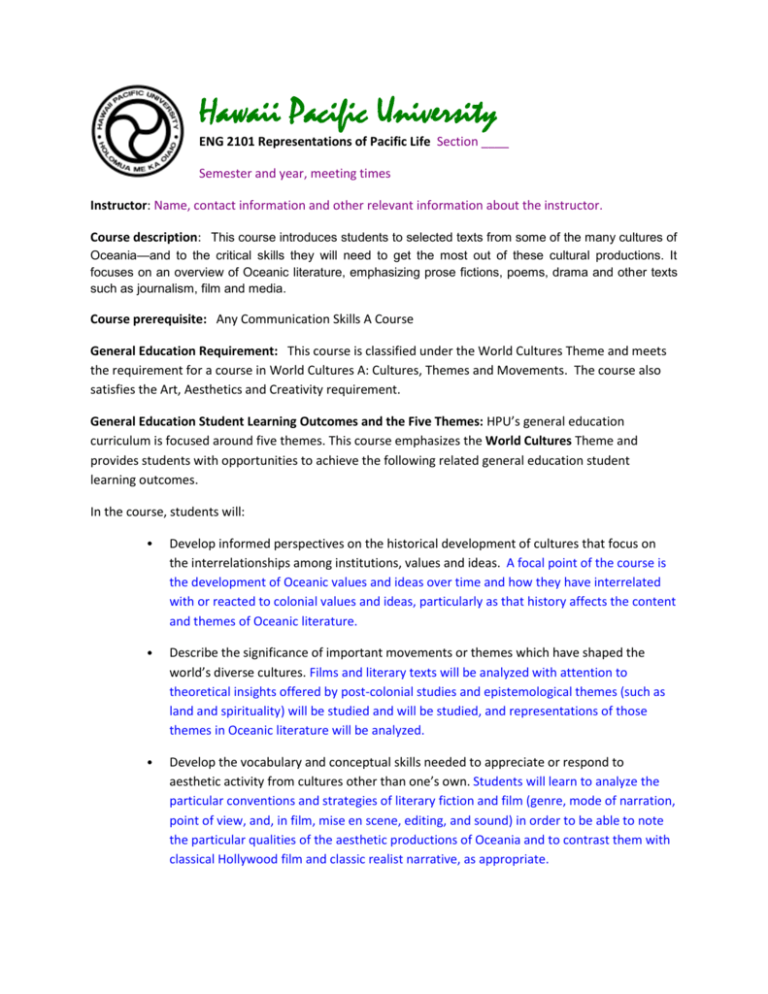
Hawaii Pacific University ENG 2101 Representations of Pacific Life Section ____ Semester and year, meeting times Instructor: Name, contact information and other relevant information about the instructor. Course description: This course introduces students to selected texts from some of the many cultures of Oceania—and to the critical skills they will need to get the most out of these cultural productions. It focuses on an overview of Oceanic literature, emphasizing prose fictions, poems, drama and other texts such as journalism, film and media. Course prerequisite: Any Communication Skills A Course General Education Requirement: This course is classified under the World Cultures Theme and meets the requirement for a course in World Cultures A: Cultures, Themes and Movements. The course also satisfies the Art, Aesthetics and Creativity requirement. General Education Student Learning Outcomes and the Five Themes: HPU’s general education curriculum is focused around five themes. This course emphasizes the World Cultures Theme and provides students with opportunities to achieve the following related general education student learning outcomes. In the course, students will: Develop informed perspectives on the historical development of cultures that focus on the interrelationships among institutions, values and ideas. A focal point of the course is the development of Oceanic values and ideas over time and how they have interrelated with or reacted to colonial values and ideas, particularly as that history affects the content and themes of Oceanic literature. Describe the significance of important movements or themes which have shaped the world’s diverse cultures. Films and literary texts will be analyzed with attention to theoretical insights offered by post-colonial studies and epistemological themes (such as land and spirituality) will be studied and will be studied, and representations of those themes in Oceanic literature will be analyzed. Develop the vocabulary and conceptual skills needed to appreciate or respond to aesthetic activity from cultures other than one’s own. Students will learn to analyze the particular conventions and strategies of literary fiction and film (genre, mode of narration, point of view, and, in film, mise en scene, editing, and sound) in order to be able to note the particular qualities of the aesthetic productions of Oceania and to contrast them with classical Hollywood film and classic realist narrative, as appropriate. Optional: Add additional World Cultures outcomes as relevant. Some syllabi for this course also use World Cultures outcomes 4, 6 and 7 The course also addresses the Communication Skills Theme by providing students with opportunities to achieve the following related general education student learning outcome: Demonstrate critical reasoning in organizing thoughts, feelings, concepts, and information for effective, clear, and accurate oral and written communication. Discussions, response papers, and genre papers will reflect this objective and the feedback provided to the latter papers will enable students to improve their critical reasoning and organizational skills. They will receive practice in oral communication by participating in dramatic readings. Optional: Add additional gen ed outcomes as relevant under the appropriate themes. Some syllabi for this course also use Values and Choices outcomes 6 and 9, or Research and Epistemology outcome 1. Note: Purple text shows places where specific course information must be filled in. Red text provides explanatory notes to the instructor which should be deleted before using the syllabus. Blue explanations above should be rephrased by the individual instructor to reflect the specific approach in that section of the course. Course specific outcomes below are an example and may also be rephrased or modified by the instructor. Student Learning Outcomes for ENG 2101 Representations of Pacific Life Students will develop analytical skills so that they can: increase understanding of the various elements of literary construction (e.g., plot, character, theme, symbolism, etc.) explain how imagery and metaphor contribute to the meaning of a work of literary art identify the narrative point of view in fiction and appreciate the significance of the author’s choice of a particular point of view identify the structure and craftsmanship that create dramatic conflict and tension continue to develop writing and critical thinking skills through writing critical essays on literary works become familiar with critical approaches to reading literature: e.g., psychological, historical, sociological For the rest of these required syllabus items see the details in the faculty handbook. Delete this note once the syllabus is complete. For online courses there are some additional requirements given at this link. Texts List textbooks with ISBN’s and include this language as well All textbook information (pricing, ISBN #, and e-books) for this course can be found on the HPU Bookstore website: hpu.edu/bookstore. If you have any questions regarding textbooks, please contact the HPU Bookstore at: Phone: 808-544-9347 Or e-mail: jyokota@hpu.edu mmiyahira@hpu.edu Assignments and mode of evaluation Summary of important dates and deadlines (if the schedule is a separate document and due dates are not given with the description of the assignments). Class rules and policies (including regarding attendance, late work and academic dishonesty) Schedule of events (may be attached separately)
